失乐园弥尔顿中英对照翻译
- 格式:docx
- 大小:12.88 KB
- 文档页数:11
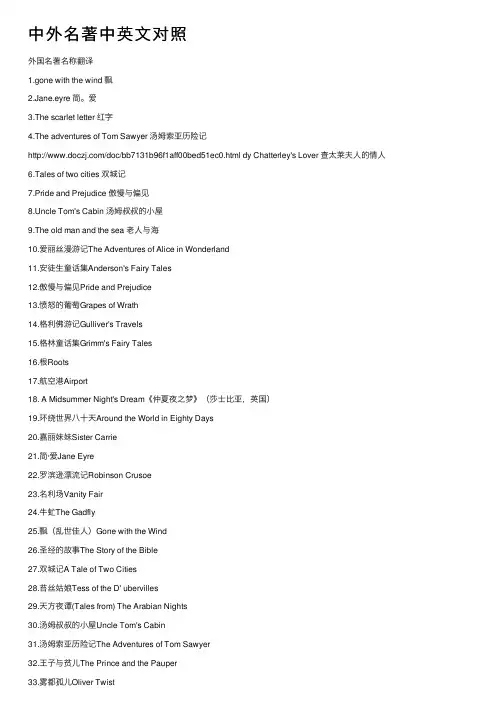
中外名著中英⽂对照外国名著名称翻译1.gone with the wind 飘2.Jane.eyre 简。
爱3.The scarlet letter 红字4.The adventures of Tom Sawyer 汤姆索亚历险记/doc/bb7131b96f1aff00bed51ec0.html dy Chatterley's Lover 查太莱夫⼈的情⼈6.Tales of two cities 双城记7.Pride and Prejudice 傲慢与偏见8.Uncle Tom's Cabin 汤姆叔叔的⼩屋9.The old man and the sea ⽼⼈与海10.爱丽丝漫游记The Adventures of Alice in Wonderland11.安徒⽣童话集Anderson's Fairy Tales12.傲慢与偏见Pride and Prejudice13.愤怒的葡萄Grapes of Wrath14.格利佛游记Gulliver's Travels15.格林童话集Grimm's Fairy Tales16.根Roots17.航空港Airport18. A Midsummer Night's Dream《仲夏夜之梦》(莎⼠⽐亚,英国)19.环绕世界⼋⼗天Around the World in Eighty Days20.嘉丽妹妹Sister Carrie21.简·爱Jane Eyre22.罗滨逊漂流记Robinson Crusoe23.名利场Vanity Fair24.⽜虻The Gadfly25.飘(乱世佳⼈)Gone with the Wind26.圣经的故事The Story of the Bible27.双城记A Tale of Two Cities28.苔丝姑娘Tess of the D' ubervilles29.天⽅夜谭(Tales from) The Arabian Nights30.汤姆叔叔的⼩屋Uncle Tom's Cabin31.汤姆索亚历险记The Adventures of Tom Sawyer32.王⼦与贫⼉The Prince and the Pauper33.雾都孤⼉Oliver Twist34.伊索寓⾔Aesop's Fables35.远⼤前程The Great Expectations36.⽉亮宝⽯The Moonstone37.最后的诊断The Final Diagnosis38.Charles Darwin (by Carla Greene) 查尔斯;达尔⽂39.John F. Kennedy (by Charles P. Graves) 约翰;肯尼迪40.King Arthur and His Knights (by William Kottmeyer) 亚瑟王和他的骑⼠41.One Million Pound (by Mark Twain) 百万英镑42.Robin Hood (adapted by Michael West) 罗宾汉43.Rip Van Winkle (adapted by Michael West) ⾥普;范;温格尔44.Stories from the Sands of Africa (adapted by Michael West) ⾮洲沙漠的故事45.Tales from the Arabian Nights (adapted by Michael West) 天⽅夜谭46.The Canterbury Tales (adapted by Michael West) 坎特伯雷故事集47.The House of a Thousand Lanterns (by Victoria Holt) 千灯府48.The Legends of Ancient Rome 古罗马的传说49.The Mystery of the Island (by Jules Verne) 神秘的海岛50.The Seventh Key 第七把钥匙51.Three Men on the Bummel (by K. Jerome) 三⼈出游记52.Tom Jones (by Henry Fielding) 汤姆;琼斯53.Airport (by Arthur Hailey) 航空港54.Around the World in Eighty Days (by Jules Verne) 环绕世界⼋⼗天55. A Separate Peace (by John Knowles) 独⾃和解56.Daisy Miller (by H. James) 黛丝密勒57.Dr Jekyll and Mr Hyde (by R. L. Stevenson) 化⾝博⼠58.Flowers for Mrs. Harris (by Paul Gallico) 献给哈⾥斯夫⼈的鲜花59.Frankenstein (by Mary Shelly) 弗兰肯斯特60.Hatter's Castle (by A. J. Cronin) 帽商的城堡61.Little Tom (by B. Bell & D. Bell) ⼩汤姆62.Lucky Jim (by Kingsley Amis) 幸运的吉姆63.The Adventures of Alice in Wonderland (by Lewis Carrol) 艾丽斯漫游记64.The Black Tulip (by Alexandre Dumas) ⿊郁⾦⾹65.The Life of Abraham Lincoln (by Stegan Lorant) 林肯传66.The Mill on the Floss (by George Eliot) 弗洛斯河上的磨坊67.The Prince and the Pauper (by Mark Twain) 王⼦和贫⼉68.The Red Badge of Courage (by Stephen Crane) 红⾊英勇勋章69.The Scapegoat (by Daphne Du Maurier) 替罪⽺70.The Sign of Indra 印达拉神像71.Thirty-nine Steps (by John Buchan) 三⼗九级台阶72.Three Men in a Boat (by J. K. Jerome) 三⼈同⾈73.Tom Brown's Schooldays (by Thomas Hughes) 汤姆;布朗的求学时代74.Witch (by George Mackay Brown) ⼥巫75.Aesop's Fables 伊索寓⾔76.Anderson's Fairy Tales 安徒⽣通话选/doc/bb7131b96f1aff00bed51ec0.html pell's Kingdom (by Hammond Innes) 坎伯尔王国78.Frontiers of Science 科学的新领域79.Grimm's Fairy Tales 格林通话选80.Hotel (by Arthur Hailey) 旅馆81.Jamaica Inn (by Daphne Du Maurier) ⽛买加旅店82.Popular Science Readings 英语科普⼩品83.Roots (by Alex Harley) 根84.Stories from Shakespeare (adapted by H. G. Wyatt) 莎⼠⽐亚戏剧故事集85.The Adventures of Huckleberry Fin (by Mark Twain) 哈克贝⾥芬历险记86.The Adventures of Tom Sawyer (by Mark Twain) 汤姆索亚历险记87.The “Caine” Mutiny (by Herman Wink) “该隐”号兵变记88.The Citadel (by A. J. Cronin) 堡垒89.The Good Soldier Schweik (by Jaroslav Hasek, trans. By Paul Selver) 好兵帅克90.The Moonstone (by Wilkie Collins) ⽉亮宝⽯91.The Pearl (by John Steinbeck) 珍珠92.The Story of Madame Curie ( by Alice Thorne) 居⾥夫⼈传93.Uncle Tom's Cabin (by H. Beecher Stowe) 汤姆叔叔的⼩屋94.Anna Karenina (by Leo Tolstoy) 安娜;卡列尼娜95. A Tale of Two Cities (by Charles Dickens) 双城记96.David Copperfield (by Charles Dickens) ⼤卫考伯菲尔德97.Emma (by Jane Austen) 爱玛98.Far from the Madding Crowd (by Thomas Hardy) 远离尘嚣99.Frenchman's Creek (by Charles Dickens) 法国⼈的⼩港湾100.Great Expectations (by Charles Dickens) 远⼤前程101.Gulliver's Travels (by Jonathan Swift) 格利佛游记102.Jane Eyre (by Charlotte Bronte) 简爱103.Jaws (by Peter Benchley) ⼤⽩鲨104.Lucky Jim (by Kinsley Amis) 幸运的吉姆105.Nicholas Nickleby (by Charles Dickens) 尼古拉斯.尼克尔贝106.Mary Barton (by Elizabeth Cleghorn Gaskell) 玛丽.巴顿107.Monte Cristo (by Alexandre Dumas) 基度⼭伯爵108.Oliver Twist (by Charles Dickens) 雾都孤⼉109.Pride and Prejudice (by Jane Austen) 傲慢与偏见110.Rebecca (by Daphne Du Maurier) 蝴蝶梦111.Silas Marner (by George Eliot) 塞拉斯.马纳112.Tess of the D'ubervilles (by Thomas Hardy) 德伯家的苔丝113.The Green Years (by A. Cronin) 青春的岁⽉114.The Hunckback of Notre Dame (by Victor Hugo) 巴黎圣母院115.The Mayor of Casterbridge (by Thomas Hardy) 卡斯特桥市长116.The Three Musketeers (by Alexandre Dumas) 三个⽕枪⼿117.Treasure Island (by R. L. Steveson) ⾦银岛118.Vanity Fair (by W. M. Thackeray) 名利场119.Woman in White (by Wilkie Collins) ⽩⾐⼥⼈120.A Doll's House《玩偶之家》(亨⾥克·易⼘⽣,挪威)121.Alice's Adventures in Wonderland (by Lewis Carrol) 艾丽斯漫游记122.Child's History of England (by Charles Dickens) ⼉童英国史123.Good-bye, Mr. Chips (by James Hilton) 再会,契普斯先⽣124.INTERPOL (by Peter G. Lee) 国际警察组织125.Robinson Crusoe (by Daniel Defoe) 鲁滨逊漂流记126.The Gadfly (by E. L. Voynich) ⽜虻127.The Story of the Bible (by Van Loon) 圣经的故事128.The Story of Mankind (by H. William Van Loon) ⼈类的故事129.The Great Road (by Agnes Smedley) 伟⼤的道路130.An Inspector Calls (by J. B. Priestley) 罪恶之家131.An Invisible Man (by H. G. Wells) 隐⾝⼈132.A Tale of Two Cities (by Charles Dickens) 双城记133.David Copperfield (by Charles Dickens) ⼤卫.考伯菲尔德134.Emma (by Jane Austen) 爱玛135.Gone with the Wind (by Margaret Mitchell) 飘136.Gulliver's Travels (by Jonathan Swift) 格利佛游记137.Hotel (by Arthur Hailey) 旅馆138.Oliver Twist (by Charles Dickens) 雾都孤⼉139.Pride and Prejudice (by Jane Austen) 傲慢与偏见140.Pygmalion (by Bernald Shaw) 茶花⼥141.Red Star over China (by Edgar Snow) 西⾏漫记142.Roots (by Alex Haley) 根143.Selected Readings from D. H. Lawrence 劳伦斯作品选读144.The Adventures of Huckleberry Fin (by mark Twain) 哈克.贝⾥芬历险记145.The Adventures of Tom Sawyer (by Mark Twain) 汤姆.索亚历险记146.The Jungle (by Upton Sinclair) 丛林147.The Old Man and The Sea (by Ernest Hemingway) ⽼⼈与海148.The Ragged Trousered Philanthropists (by Robert Tressell) 穿破裤⼦的慈善家149.The Rise and Fall of the Third Reich (by William L. Shirer) 第三帝国的兴亡150.Uncle Tom's Cabin (by H. Beecher Stowe) 汤姆叔叔的⼩屋151.Winds of War (by Herman Woul) 战争风云152.A Farewell to Arms (by Ernest Hemingway) 永别了武器153.Airport (by Arthur Hailey) 航空港154.A Tale of Two Cities (by Charles Dickens) 双城记155.Financier (by Theodore Dreiser) 财政家156.Grapes of Wrath (by J. Steinbeck) 愤怒的葡萄157.Jane Eyre (by Charlotte Bronte) 简爱158.Jude the Obscure (by Thomas Hardy) ⽆名的裘德/doc/bb7131b96f1aff00bed51ec0.html dy Chatterley's Lover (by D. H. Lawrence)查泰莱夫⼈德情⼈160.Martin Eden (by Jack London) 马丁.伊登161.Pride and Prejudice (by Jane Austen) 傲慢与偏见162.Sense and Sensibility (by Jane Austen) 理智与情感163.Sister Carrie (by Theodore Dreiser) 嘉丽妹妹164.Sons and Lovers (by D. H. Lawrence) ⼉⼦和情⼈165.Tess of the D'ubervilles (by Thomas Hardy) 德伯家的苔丝166.The American Tragedy (by Theodore Dreiser) 美国的悲剧167.The Final Diagnosis (by Arthur Hailey) 最后的诊断168.The God Father (by Mario Puzo) 教⽗169.The Great Gatsby (by F. Scott Fitzgerald) 了不起的盖茨⽐170.The Hunckback of Notre Dame (by Victor Hugo) 巴黎圣母院171.The Moneychangers (by Arthur Hailey) 钱商172.The Rainbow (by D. H. Lawrence) 虹173.The Red and The Black (by Stendhal) 红与⿊174.The Return to the Native (by Thomas Hardy) 还乡175.The Scarlet Letter (by Nathaniel Hawthorne) 红字176.The Sun Also Rises (by Ernest Hemingway) 太阳照样升起177.The Thorn Birds (by Colleen Mccullough) 荆棘鸟178.The Three Musketeers (by Alexandre Dumas) 三个⽕枪⼿179.Vanity Fair (by W. M. Thackeray) 名利场180.Wives and Daughters (by Elizabeth Gaskell) 妻⼦与⼥⼉181.Wuthering Heights (by Emily Bronte) 呼啸⼭庄182.A Thousand and One Nights《⼀千零⼀夜》183.Adam Bede《亚当·贝德》(乔治·艾略特,英国)184.All's Well That Ends Well《终成眷属》(莎⼠⽐亚,英国)185.As You Like it《皆⼤欢喜》(莎⼠⽐亚,英国)186.Bel-Ami《漂亮朋友》(基·德·莫泊桑,法国)187.Childe Harold's Pilgrimage《查尔德·哈罗德游记》(拜伦,英国)188.Crime and Punishment《罪与罚》(陀斯妥也夫斯基,俄国〕189.Don Juan《唐璜》(乔治·⼽登·拜伦,英国)190.Elegy Written in a Country Churchyard《墓地衰歌》(托马斯·格雷,英国) 191.Essays《培根论说⽂集》(弗郎西斯·培根,英国)192.For Whom the Bell Tolls《丧钟为谁⽽鸣》(海明威,美国)193.Good Wives《好妻⼦》(露易莎·梅·奥尔科特,美国)194.Hamlet《哈姆雷特》(莎⼠⽐亚,英国)195.Jean-Christophe(《约翰·克利斯朵夫》(罗曼·罗兰,法国)196.King Lear《李尔王》(莎⼠⽐亚,英国)197.Les Miserables《悲惨世界》(⾬果,法国)198.Little Women《⼩妇⼈》(露易莎·梅·奥尔科特,美国)199.Love of Life《热爱⽣命》(杰克.伦敦,美国)200.Mansfiela Park《曼斯菲尔德庄园》(简·奥斯汀,英国)201.Measure for Measure《⾃作⾃受》(莎⼠⽐亚,英国)202.Mrs. Warren's Profession《沃伦夫⼈的职业》(乔治·伯纳德·肖,英国) 203.Much ado about Nothing《⽆事⽣⾮》(莎⼠⽐亚,英国)204.Nature《⾃然》(拉尔夫·沃尔多·爱默⽣,美国)205.Ode to a Nightingale《夜莺颂》(约翰·济慈,英国)206.Oliver Twist《雾都孤⼉》(查尔斯·狄更斯,英国)207.Othello《奥赛罗》(莎⼠⽐亚,英国)208.Paradise Lost《失乐园》(约翰·弥尔顿,英国)209.Persuasion《劝说》(简·奥斯汀,英国)210.Women in Love《恋爱中的⼥⼈》(劳伦斯,英国)中国名著的英⽂翻译中国名著的英⽂翻译211.《西游记》Pilgrimage to the West; Journey to the West 212.《三国演义》The Romance of the Three Kingdoms 213.《红楼梦》A Dream in Red Mansions (The Story of the Stone) 214.《⽔浒传》Heroes of the Marshes; Water Margins 215.《本草纲⽬》Compendium of Materia Medica216.《聊斋志异》Strange Tales of a Lonely Studio217.《论语》Analects of Confucius218.《⼭海经》the Classic of Mountains and Rivers219.《围城》A Surrounded City220.《西厢记》The Romance of West Chamber221.《资治通鉴》History as a Mirror222.《史记》Shi Ji/ Historical Records223.《战国策》Stratagems of the Warring States224.《⼤学》The Great Learning225.《中庸》The Doctrine of the Mean226.《论语》The Analects of Confucius227.《孟⼦》The Words of Mencius228.《诗经》The Book of Songs229.《书经》The Book of History230.《易经》The Book of Changes231.《礼记》The Book of Rites232.《西厢记》Romance of the Western Chamber233.《阿Q正传》The True Story of Ah Q234.《春秋》Spring and Autumn Annals235.《诗经> the book of odes236.《世说新语》essays and criticism (shi shuo hsin yu)237.《世纪新说》New sayings of the World238.《封神演义》the legend of deification239.《⾦瓶梅》The golden lotus。
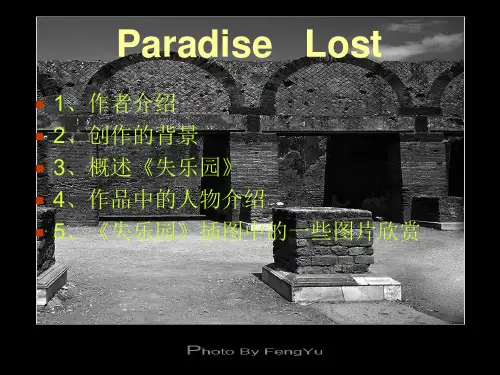
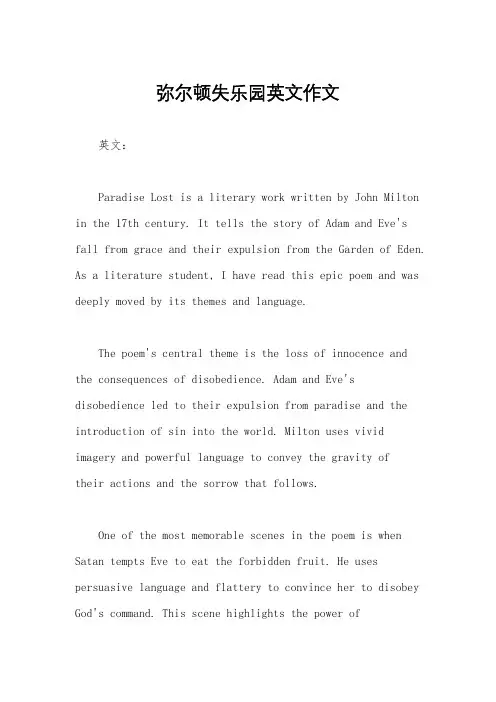
弥尔顿失乐园英文作文英文:Paradise Lost is a literary work written by John Milton in the 17th century. It tells the story of Adam and Eve'sfall from grace and their expulsion from the Garden of Eden. As a literature student, I have read this epic poem and was deeply moved by its themes and language.The poem's central theme is the loss of innocence and the consequences of disobedience. Adam and Eve's disobedience led to their expulsion from paradise and the introduction of sin into the world. Milton uses vivid imagery and powerful language to convey the gravity oftheir actions and the sorrow that follows.One of the most memorable scenes in the poem is when Satan tempts Eve to eat the forbidden fruit. He uses persuasive language and flattery to convince her to disobey God's command. This scene highlights the power oftemptation and the dangers of giving in to our desires.Another notable aspect of the poem is Milton's use of blank verse. This form of poetry does not rhyme, but it has a natural rhythm that mimics the cadence of speech. This makes the poem feel more like a conversation than a formal piece of literature.Overall, Paradise Lost is a masterpiece of English literature that explores timeless themes of temptation, disobedience, and redemption. Its language and imagery continue to inspire readers and writers today.中文:《失乐园》是17世纪约翰·弥尔顿所写的文学作品。
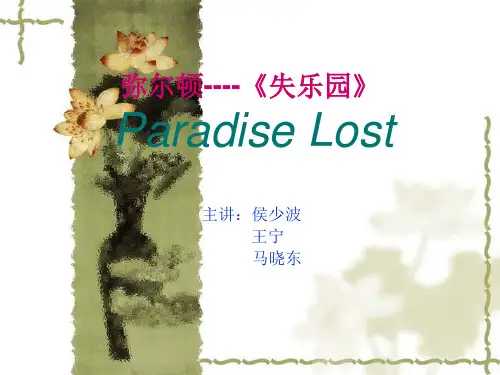
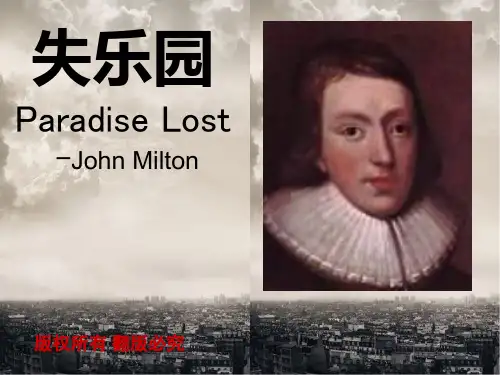
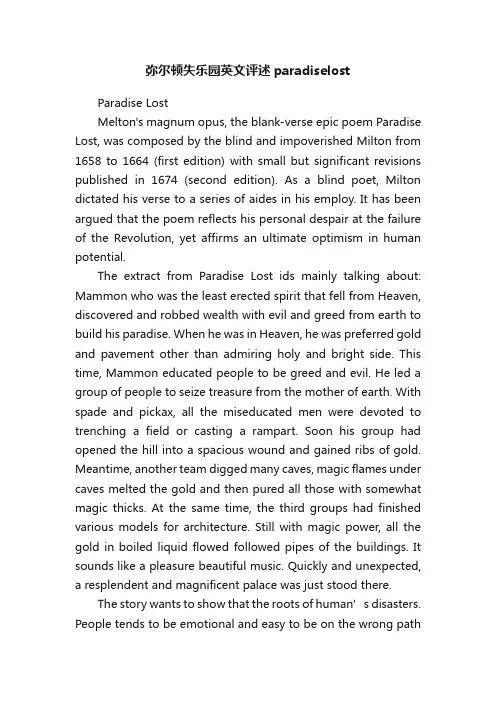
弥尔顿失乐园英文评述paradiselostParadise LostMelton's magnum opus, the blank-verse epic poem Paradise Lost, was composed by the blind and impoverished Milton from 1658 to 1664 (first edition) with small but significant revisions published in 1674 (second edition). As a blind poet, Milton dictated his verse to a series of aides in his employ. It has been argued that the poem reflects his personal despair at the failure of the Revolution, yet affirms an ultimate optimism in human potential.The extract from Paradise Lost ids mainly talking about: Mammon who was the least erected spirit that fell from Heaven, discovered and robbed wealth with evil and greed from earth to build his paradise. When he was in Heaven, he was preferred gold and pavement other than admiring holy and bright side. This time, Mammon educated people to be greed and evil. He led a group of people to seize treasure from the mother of earth. With spade and pickax, all the miseducated men were devoted to trenching a field or casting a rampart. Soon his group had opened the hill into a spacious wound and gained ribs of gold. Meantime, another team digged many caves, magic flames under caves melted the gold and then pured all those with somewhat magic thicks. At the same time, the third groups had finished various models for architecture. Still with magic power, all the gold in boiled liquid flowed followed pipes of the buildings. It sounds like a pleasure beautiful music. Quickly and unexpected, a resplendent and magnificent palace was just stood there.The story wants to show that the roots of human’s disasters. People tends to be emotional and easy to be on the wrong pathdue to lack of rational, strong will. That’s why people would always break regulations when influenced by various factors from the outside of the world. So is paradise lost. The author criticised those attitude and ill-mind. He affirmed people’s gumption, negated infinite hedonism. And also he affirmed people’s sens e of pride, negated the breeding pride and ambition. Just like the least erected spirit Mammon, he was too evil and greedy, and mislead the delicate human to be the same ones. They destroyed the earth, plundered the wealth resources of earth. All these com from their easily broken will. People there build up the resplendent and magnificent palace, hoping eternally lived in easy and comfortable without worries and danger.In the extract of Paradise Lost, Milton shows excellent means of artistic expression. Dazzling and lyric figure of speech. Such as veins of liquid fire, as in an organ from one blast of wind, rose like an exholatior, or build like a temple. He also use the manner in which Latin is used in speaking or writing. Furthermore,he used canorous tone which expressed the sweet of tonality. For example, too many arow of pipes the sound-board breathes anon out of the earth a fabric huge of dulcet symphonies and voices sweet. There is also a part of argument by Milton in the extract, let none admire that riches grow in hell. That soil may bestdeserve the precious bane. And here let those who boast in mortal things, and wondering tell of Babel, and the works of Memphian kings. Learn how their greatest monuments of fame, and strength, and art, are easily out-done by spirits reprobate, and in an hour what in an age they with incessant toil and hands innumerable scarce perform.Features of Milton’s works.(1) Milton is one of the very few truly great English writers who is also a prominent figure in politics, and who is both a great poet and an important prose writer. The two most essential things to be remembered about him are his Puritanism and his republicanism.(2) Milton wrote many different types of poetry. He is especially a great master of blank verse. He learned much from Shakespeare and first used blank verse in non-dramatic works.(3) Milton is a great stylist. He is famous for his grand style noted for its dignity and polish, which is the result of his life-long classical and biblical study.(4) Milton has always been admired for his sublimit of thought and majesty of expression.。
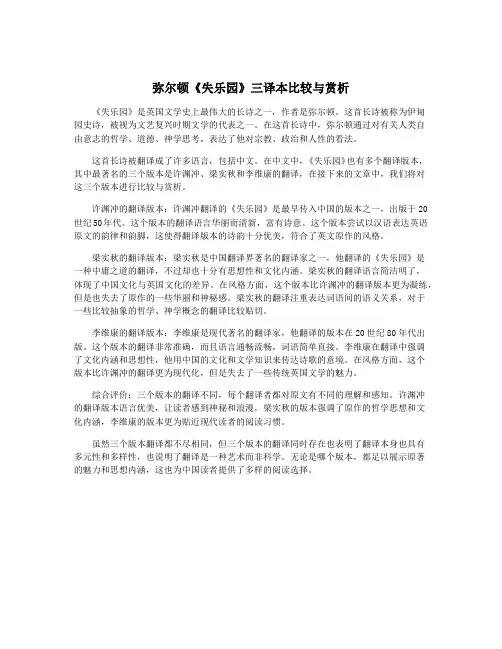
弥尔顿《失乐园》三译本比较与赏析《失乐园》是英国文学史上最伟大的长诗之一,作者是弥尔顿。
这首长诗被称为伊甸园史诗,被视为文艺复兴时期文学的代表之一。
在这首长诗中,弥尔顿通过对有关人类自由意志的哲学、道德、神学思考,表达了他对宗教、政治和人性的看法。
这首长诗被翻译成了许多语言,包括中文。
在中文中,《失乐园》也有多个翻译版本,其中最著名的三个版本是许渊冲、梁实秋和李维康的翻译,在接下来的文章中,我们将对这三个版本进行比较与赏析。
许渊冲的翻译版本:许渊冲翻译的《失乐园》是最早传入中国的版本之一,出版于20世纪50年代。
这个版本的翻译语言华丽而清新,富有诗意。
这个版本尝试以汉语表达英语原文的韵律和韵脚,这使得翻译版本的诗韵十分优美,符合了英文原作的风格。
梁实秋的翻译版本:梁实秋是中国翻译界著名的翻译家之一,他翻译的《失乐园》是一种中庸之道的翻译,不过却也十分有思想性和文化内涵。
梁实秋的翻译语言简洁明了,体现了中国文化与英国文化的差异。
在风格方面,这个版本比许渊冲的翻译版本更为凝练,但是也失去了原作的一些华丽和神秘感。
梁实秋的翻译注重表达词语间的语义关系,对于一些比较抽象的哲学、神学概念的翻译比较贴切。
李维康的翻译版本:李维康是现代著名的翻译家,他翻译的版本在20世纪80年代出版。
这个版本的翻译非常准确,而且语言通畅流畅,词语简单直接。
李维康在翻译中强调了文化内涵和思想性,他用中国的文化和文学知识来传达诗歌的意境。
在风格方面,这个版本比许渊冲的翻译更为现代化,但是失去了一些传统英国文学的魅力。
综合评价:三个版本的翻译不同,每个翻译者都对原文有不同的理解和感知。
许渊冲的翻译版本语言优美,让读者感到神秘和浪漫,梁实秋的版本强调了原作的哲学思想和文化内涵,李维康的版本更为贴近现代读者的阅读习惯。
虽然三个版本翻译都不尽相同,但三个版本的翻译同时存在也表明了翻译本身也具有多元性和多样性,也说明了翻译是一种艺术而非科学。

Paradise LostMelton's magnum opus, the blank-verse epic poem Paradise Lost, was composed by the blind and impoverished Milton from 1658 to 1664 (first edition) with small but significant revisions published in 1674 (second edition). As a blind poet, Milton dictated his verse to a series of aides in his employ. It has been argued that the poem reflects his personal despair at the failure of the Revolution, yet affirms an ultimate optimism in human potential.The extract from Paradise Lost ids mainly talking about: Mammon who was the least erected spirit that fell from Heaven, discovered and robbed wealth with evil and greed from earth to build his paradise. When he was in Heaven, he was preferred gold and pavement other than admiring holy and bright side. This time, Mammon educated people to be greed and evil. He led a group of people to seize treasure from the mother of earth. With spade and pickax, all the miseducated men were devoted to trenching a field or casting a rampart. Soon his group had opened the hill into a spacious wound and gained ribs of gold. Meantime, another team digged many caves, magic flames under caves melted the gold and then pured all those with somewhat magic thicks. At the same time, the third groups had finished various models for architecture. Still with magic power, all the gold in boiled liquid flowed followed pipes of the buildings. It sounds like a pleasure beautiful music. Quickly and unexpected, a resplendent and magnificent palace was just stood there.The story wants to show that the roots of human’s disasters. People tends to be emotional and easy to be on the wrong path due to lack of rational, strong will. That’s why people would always break regulations when influenced by various factors from the outside of the world. So is paradise lost. The author criticised those attitude and ill-mind. He affirmed people’s gumption, negated infinite hedonism. And also he affirmed people’s sense of pride, negated the breeding pride and ambition. Just like the least erected spirit Mammon, he was too evil and greedy, and mislead the delicate human to be the same ones. They destroyed the earth, plundered the wealth resources of earth. All these com from their easily broken will. People there build up the resplendent and magnificent palace, hoping eternally lived in easy and comfortable without worries and danger.In the extract of Paradise Lost, Milton shows excellent means of artistic expression. Dazzling and lyric figure of speech. Such as veins of liquid fire, as in an organ from one blast of wind, rose like an exholatior, or build like a temple. He also use the manner in which Latin is used in speaking or writing. Furthermore,he used canorous tone which expressed the sweet of tonality. For example, too many arow of pipes the sound-board breathes anon out of the earth a fabric huge of dulcet symphonies and voices sweet. There is also a part of argument by Milton in the extract, let none admire that riches grow in hell. That soil may bestdeserve the precious bane. And here let those who boast in mortal things, and wondering tell of Babel, and the works of Memphian kings. Learn how their greatest monuments of fame, and strength, and art, are easily out-done by spirits reprobate, and in an hour what in an age they with incessant toil and hands innumerable scarce perform.Features of Milton’s works.(1) Milton is one of the very few truly great English writers who is also a prominent figure in politics, and who is both a great poet and an important prose writer. The two most essential things to be remembered about him are his Puritanism and his republicanism.(2) Milton wrote many different types of poetry. He is especially a great master of blank verse. He learned much from Shakespeare and first used blank verse in non-dramatic works.(3) Milton is a great stylist. He is famous for his grand style noted for its dignity and polish, which is the result of his life-long classical and biblical study.(4) Milton has always been admired for his sublimit of thought and majesty of expression.。
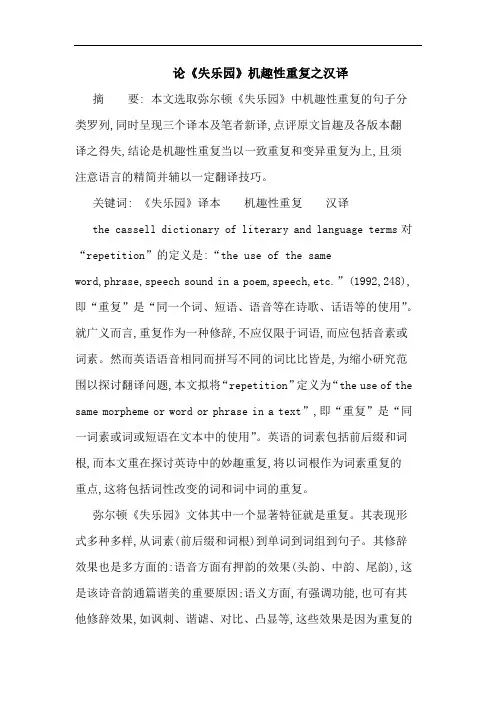
论《失乐园》机趣性重复之汉译摘要: 本文选取弥尔顿《失乐园》中机趣性重复的句子分类罗列,同时呈现三个译本及笔者新译,点评原文旨趣及各版本翻译之得失,结论是机趣性重复当以一致重复和变异重复为上,且须注意语言的精简并辅以一定翻译技巧。
关键词: 《失乐园》译本机趣性重复汉译the cassell dictionary of literary and language terms对“repetition”的定义是:“the use of the sameword,phrase,speech sound in a poem,speech,etc.”(1992,248),即“重复”是“同一个词、短语、语音等在诗歌、话语等的使用”。
就广义而言,重复作为一种修辞,不应仅限于词语,而应包括音素或词素。
然而英语语音相同而拼写不同的词比比皆是,为缩小研究范围以探讨翻译问题,本文拟将“repetition”定义为“the use of the same morpheme or word or phrase in a text”,即“重复”是“同一词素或词或短语在文本中的使用”。
英语的词素包括前后缀和词根,而本文重在探讨英诗中的妙趣重复,将以词根作为词素重复的重点,这将包括词性改变的词和词中词的重复。
弥尔顿《失乐园》文体其中一个显著特征就是重复。
其表现形式多种多样,从词素(前后缀和词根)到单词到词组到句子。
其修辞效果也是多方面的:语音方面有押韵的效果(头韵、中韵、尾韵),这是该诗音韵通篇谐美的重要原因;语义方面,有强调功能,也可有其他修辞效果,如讽刺、谐谑、对比、凸显等,这些效果是因为重复的机智妙趣,往往是妙手偶得,也可能是有意经营。
其实该诗机趣性重复占重复的比例并不大,而其翻译的质量可谓译文质量的试金石。
译文对原文的重复不外四种处理方式,一是一致重复(用词与被重复对象完全一致),二是变异重复(用词与被重复对象部分一致或词序掉转),三是他词替代,四是不重复。
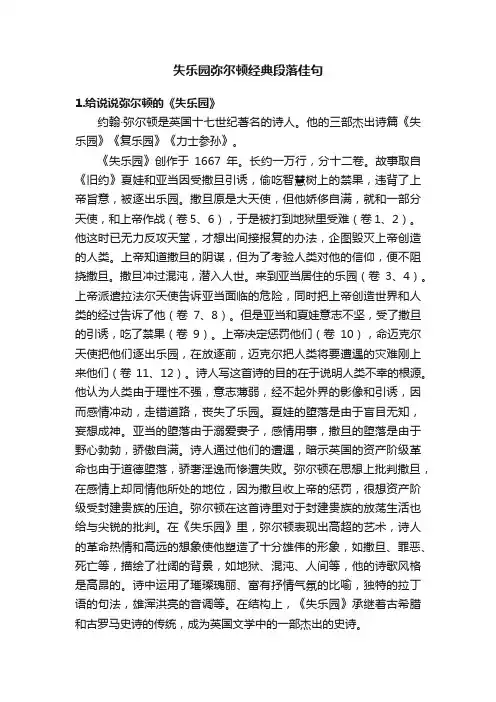
失乐园弥尔顿经典段落佳句1.给说说弥尔顿的《失乐园》约翰·弥尔顿是英国十七世纪著名的诗人。
他的三部杰出诗篇《失乐园》《复乐园》《力士参孙》。
《失乐园》创作于1667年。
长约一万行,分十二卷。
故事取自《旧约》夏娃和亚当因受撒旦引诱,偷吃智慧树上的禁果,违背了上帝旨意,被逐出乐园。
撒旦原是大天使,但他娇侈自满,就和一部分天使,和上帝作战(卷5、6),于是被打到地狱里受难(卷1、2)。
他这时已无力反攻天堂,才想出间接报复的办法,企图毁灭上帝创造的人类。
上帝知道撒旦的阴谋,但为了考验人类对他的信仰,便不阻挠撒旦。
撒旦冲过混沌,潜入人世。
来到亚当居住的乐园(卷3、4)。
上帝派遣拉法尔天使告诉亚当面临的危险,同时把上帝创造世界和人类的经过告诉了他(卷7、8)。
但是亚当和夏娃意志不坚,受了撒旦的引诱,吃了禁果(卷9)。
上帝决定惩罚他们(卷10),命迈克尔天使把他们逐出乐园,在放逐前,迈克尔把人类将要遭遇的灾难刚上来他们(卷11、12)。
诗人写这首诗的目的在于说明人类不幸的根源。
他认为人类由于理性不强,意志薄弱,经不起外界的影像和引诱,因而感情冲动,走错道路,丧失了乐园。
夏娃的堕落是由于盲目无知,妄想成神。
亚当的堕落由于溺爱妻子,感情用事,撒旦的堕落是由于野心勃勃,骄傲自满。
诗人通过他们的遭遇,暗示英国的资产阶级革命也由于道德堕落,骄奢淫逸而惨遭失败。
弥尔顿在思想上批判撒旦,在感情上却同情他所处的地位,因为撒旦收上帝的惩罚,很想资产阶级受封建贵族的压迫。
弥尔顿在这首诗里对于封建贵族的放荡生活也给与尖锐的批判。
在《失乐园》里,弥尔顿表现出高超的艺术,诗人的革命热情和高远的想象使他塑造了十分雄伟的形象,如撒旦、罪恶、死亡等,描绘了壮阔的背景,如地狱、混沌、人间等,他的诗歌风格是高昂的。
诗中运用了璀璨瑰丽、富有抒情气氛的比喻,独特的拉丁语的句法,雄浑洪亮的音调等。
在结构上,《失乐园》承继着古希腊和古罗马史诗的传统,成为英国文学中的一部杰出的史诗。
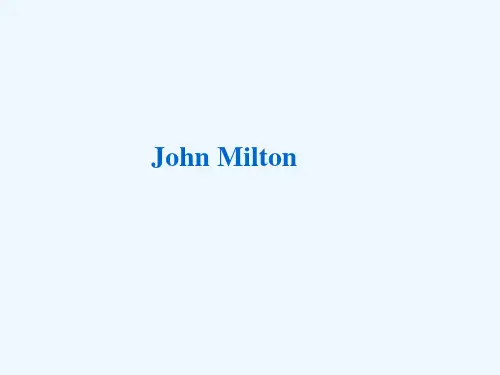
《失乐园》是一部气势喧昂的史诗式作品。
其作者是约翰·弥尔顿(John Milton1608-1674),十七世纪英国杰出的诗人和思想家,是继莎士比亚后最伟大的诗人,生活在风云动荡的十七世纪。
要充分理解这首诗,首先要对弥尔顿生活的风云年代和社会有所了解。
其双亲有相当的文化素养,同时又有强烈的清教主义倾向,家境比较富裕。
从小就受家庭中浓烈的文化气息和宗教意识的熏陶。
他的一生和创作大约可分为三个时期:他12岁始从学于博览群书的名师,十七岁时进入剑桥大学,并开始用拉丁语和英文写诗;1638-1639年间,他前往欧洲旅行,这一时期主要作品是一些短诗,比较优秀的有《利西达斯》(Lycidas,1637)等。
1639年,英国资产阶级革命即将爆发,他返回英国。
随后的二十多年中,他积极投身英国革命,发表了大量的散文和政论文,为英国革命辩护。
革命成功后被委任为共和国的拉丁秘书,负责处理大量外交信函。
因劳累过度,目力受损,1652年,他双目逐渐失明,仍坚持不辍。
在此期间,发表大量的革命文章。
其中比较著名的有《为英国人民申辩》(Defense of the English People,1650)等。
1660年王朝复辟后,弥尔顿被捕入狱,但在亲友的积极营救之下,很快被释放。
从此开始了他第三时期的创作,先后完成了最著名的以圣经故事为题材的三部长篇诗作《失乐园》(Paradise Lost,1667)、《复乐园》(Paradise Regained,1671)和《力士参孙》(Samson Agonistes,1671)。
弥尔顿的作品同时体现了欧洲两种最重要的文学传统:以荷马史诗为代表的古希腊罗马文学和文艺复兴文学。
他的最后一部作品《力士参孙》描写了主人公在失明后思想、精神上的升华,在一定程度上是弥尔顿自己的一生忠实写照。
王朝复辟后(1660年),这时弥尔顿双目失明,变得衰老、落魄。
这时,他开始了一部伟大著作的创作,希望它能表现出他心中一直渴望实现的雄心壮志。
失乐园《失乐园》(Paradise Lost),全文12卷,以史诗一般的磅礴气势揭示了人的原罪与堕落。
诗中叛逆天使撒旦,因为反抗上帝的权威被打入地狱,却仍不悔改,负隅反抗,为复仇寻至伊甸园。
亚当与夏娃受被撒旦附身的蛇的引诱,偷吃了上帝明令禁吃的分辨善恶的树上的果子。
最终,撒旦及其同伙遭谴全变成了蛇,亚当与夏娃被逐出了伊甸园。
该诗体现了诗人追求自由的崇高精神,是世界文学史、思想史上的一部极重要的作品。
作者简介弥尔顿(1608~1 约翰·弥尔顿674)英国诗人、政论家。
1608年12月9日出生于伦敦一个富裕的清教徒家庭。
父亲爱好文学,受其影响,弥尔顿从小喜爱读书,尤其喜爱文学。
1625年16岁时入剑桥大学,并开始写诗,1632年取得硕士学位。
因目睹当时国教日趋反动,他放弃了当教会牧师的念头,闭门攻读文学6 年,一心想写出能传世的伟大诗篇。
1638年弥尔顿为增长见闻到当时欧洲文化中心意大利旅行,拜会了当地的文人志士,其中有被天主教会囚禁的伽利略。
弥尔顿深为伽利略在逆境中坚持真理的精神所感动。
翌年听说英国革命即将爆发,便中止旅行,仓促回国,投身革命运动。
1641年,弥尔顿站在革命的清教徒一边,开始参加宗教论战,反对封建王朝的支柱国教。
他在一年多的时间里发表了5本有关宗教自由的小册子,1644年又为争取言论自由而写了《论出版自由》。
1649年,革命阵营中的独立派将国王推上断头台,成立共和国。
弥尔顿为提高革命人民的信心和巩固革命政权,发表《论国王与官吏的职权》等文,并参加了革命政府工作,担任拉丁文秘书职务。
1652年因劳累过度,双目失明。
1660年,王朝复辟,弥尔顿被捕入狱,不久又被释放。
从此他专心写诗,为实现伟大的文学抱负而艰苦努力,在亲友的协助下,共写出3首长诗:《失乐园》(1667),《复乐园》(1671)和《力士参孙》(1671)。
1674年11月8日卒于伦敦。
2作品概述《失乐园》(Paradise Lost),全文12卷,以史诗一般的磅6 《失乐园》各种版本书籍封面图片礴气势揭示了人的原罪与堕落。
Milton, John, 1608-1674. 密尔顿,约翰,1608-1674 Electronic Text Center, University of Virginia Library 1: Of Mans First Disobedience, and the Fruit 人类最初的违抗,还有那禁果 2: Of that Forbidden Tree, whose mortal tast 它那必死的味道 3: Brought Death into the World, and all our woe, 将死亡带到世上,连同我们所有的悲哀 4: With loss of EDEN, till one greater Man 自伊甸园失去,到更伟大的人 5: Restore us, and regain the blissful Seat, 修复我们,让我们重回福地 6: Sing Heav'nly Muse, that on the secret top 唱天堂般的音乐,在神秘的欧瑞伯山顶 7: Of OREB, or of SINAI, didst inspire 和西耐山顶,真正赋予那牧者灵感 8: That Shepherd, who first taught the chosen Seed, 第一个教晓那些被选出的种子 9: In the Beginning how the Heav'ns and Earth 最初天堂与大地是如何 10: Rose out of CHAOS: Or if SION Hill 在一片混沌中出现:或假如锡安山 11: Delight thee more, and SILOA'S Brook that flow'd 更喜爱你,那地底的溪流 12: Fast by the Oracle of God; I thence 恰带来神谕;我从此 13: Invoke thy aid to my adventrous Song, 让你助我完成那冒险之歌 14: That with no middle flight intends to soar 平庸者所不敢飞越的高度 15: Above th' AONIAN Mount, while it pursues 翻越阿诺安山,追逐着 16: Things unattempted yet in Prose or Rhime. 诗歌与散文里未曾尝试之事 17: And chiefly Thou O Spirit, that dost prefer 你,灵魂做主,更爱 18: Before all Temples th' upright heart and pure, 在所有庙宇之前,以正直纯粹之心 19: Instruct me, for Thou know'st; Thou from the first 指引我,因你知道:你自最初 20: Wast present, and with mighty wings outspread 即已在此,伸开有力的双翼 21: Dove-like satst brooding on the vast Abyss 鸽子般安坐在巨大的深渊前沉思 22: And mad'st it pregnant: What in me is dark 看穿我内心的黑暗 23: Illumine, what is low raise and support; 照亮那卑微,唤起并支持着我 24: That to the highth of this great Argument 直到这伟大的辩论 25: I may assert th' Eternal Providence, 我可断言永恒的天意 26: And justifie the wayes of God to men. 证明神对世人的方式 27: Say first, for Heav'n hides nothing from thy view 预言,因天对人无所隐藏 28: Nor the deep Tract of Hell, say first what cause 地狱亦是如此,言明何因 29: Mov'd our Grand Parents in that happy State, 令我们的祖先自那欢乐境界 30: Favour'd of Heav'n so highly, to fall off 先得天宠,因违背其意 31: From their Creator, and transgress his Will 从他们的创造者那里堕落 32: For one restraint, Lords of the World besides? 世界的主宰们竟然失去耐性 33: Who first seduc'd them to that fowl revolt? 引他们发动家禽般的反抗 34: Th' infernal Serpent; he it was, whose guile 邪恶的魔鬼,他的诡计 35: Stird up with Envy and Revenge, deceiv'd 因嫉妒和复仇而起,欺骗了 36: The Mother of Mankinde, what time his Pride 人类的母亲,当他的自尊 37: Had cast him out from Heav'n, with all his Host 将他自天堂抛弃,以他为首的 38: Of Rebel Angels, by whose aid aspiring 叛逆天使,因他们的热情 39: To set himself in Glory above his Peers, 赋予他高于同类的光荣 40: He trusted to have equal'd the most High, 相信他具有与最高者同等的地位 41: If he oppos'd; and with ambitious aim 他野心勃勃 42: Against the Throne and Monarchy of God 反抗神的王座和权力 43: Rais'd impious War in Heav'n and Battel proud 徒然在天堂骄傲的发起不敬的战争 44: With vain attempt. Him the Almighty Power 全能的力量 45: Hurld headlong flaming from th' Ethereal Skie 自天上投射熊熊烈火 46: With hideous ruine and combustion down 可怕的毁灭和燃烧降临 47: To bottomless perdition, there to dwell 无尽的毁灭,若无休止 48: In Adamantine Chains and penal Fire, 坚硬的锁链和惩罚之火 49: Who durst defie th' Omnipotent to Arms. 加于敢对全能之神挑战者 50: Nine times the Space that measures Day and Night 九倍于凡人以日夜计算的时间 51: To mortal men, he with his horrid crew 他和他可怕的队伍 52: Lay vanquisht, rowling in the fiery Gulfe 被击溃,倒在烈火的深渊 53: Confounded though immortal: But his doom 虽不死却充满困惑:但他的厄运 54: Reserv'd him to more wrath; for now the thought 使他更加愤怒;想起 55: Both of lost happiness and lasting pain 失去的快乐和永恒的痛苦折磨 56: Torments him; round he throws his baleful eyes 他以邪恶的眼神望向四周 57: That witness'd huge affliction and dismay 只看到巨大的痛苦和沮丧 58: Mixt with obdurate pride and stedfast hate: 混合着冷酷的骄傲和笃实的憎恨 59: At once as far as Angels kenn he views 旋以天使之眼看到 60: The dismal Situation waste and wilde, 荒芜凄惨的境遇 61: A Dungeon horrible, on all sides round 四周皆是恐怖的地牢 62: As one great Furnace flam'd, yet from those flames 如巨大的洪炉,那火焰之中 63: No light, but rather darkness visible 没有光,只有看的见的黑暗 64: Serv'd only to discover sights of woe, 只为让你看见悲哀的景象 65: Regions of sorrow, doleful shades, where peace 悲痛的领域,阴沉的影子, 66: And rest can never dwell, hope never comes 永无和平与休息,人人都有的希望在这里 67: That comes to all; but torture without end 永不来临,只有无穷的折磨 68: Still urges, and a fiery Deluge, fed 仍在以燃烧不尽的硫磺, 69: With ever-burning Sulphur unconsum'd: 持续那烈火的狂潮 70: Such place Eternal Justice had prepar'd 这样的地方是永恒的正义 71: For those rebellious, here their Prison ordain'd 为反叛者所准备,这里注定是他们的监狱